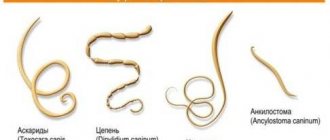Worms in dogs and puppies
These internal parasites actively “feed” on their host, damaging the mucous membranes and tissues of various organs, which, in turn, leads to even more serious diseases. Among other things, worms or helminths, as they are called in medicine, during their life processes secrete specific substances that poison the body of the animal or person on which they parasitize.
If you don't get rid of worms in time, this problem can even lead to the death of the animal! What to do if you discover that your pet has worms? Of course, go straight to a specialist who can choose an effective remedy for your cat or dog.
It should be noted that advanced forms of the disease will not be easy to cope with; treatment may take several sessions. The good news is that modern anthelmintic drugs are not as harsh as before; there are also softer drugs, but they are no less effective, and the animal survives the procedure much easier.
In fact, worms in puppies are a very common phenomenon; according to veterinarians, almost every pet has contracted this disease at least once.
At first glance, it may seem that this is a completely frivolous problem, which makes no sense to think about until it openly knocks on your door. Unfortunately, not everyone knows that most of the worms that parasitize cats and dogs are easily transmitted to humans, putting their health in serious danger, not to mention the health of the pet itself.
Types of parasites in dogs
Various types of helminths pose a danger to four-legged pets, especially puppies. Among them, three main groups can be distinguished:
All of them have a negative effect on the dog’s body, although to varying degrees, since their location can be various internal organs of the animal. Therefore, worms should be driven away when the first symptoms of the disease appear. And in the future, this procedure will have to be repeated at certain periods of time throughout the dog’s life.
The influence of parasites on the general condition of the animal
Entering the puppy’s body in various ways, most helminths then penetrate the blood vessels and then migrate through them to all internal organs. The result of their further activity is a violation of tissue integrity, which leads to deterioration of health and the development of various concomitant diseases.
Thus, parasites living in the puppy’s intestines injure its mucous membrane, which can cause both inflammation and internal bleeding. In addition, helminths feed on blood and nutrients entering the host’s body.
Symptoms: inactive and weakly growing, matte coat, white of the eye has a bluish rim
Therefore, infection with worms often leads to the development of:
- Avitaminosis
- Metabolic disorders
- Rapid weight loss.
But since worms not only take nutrients from the host, but also multiply intensively, they can cause intestinal blockage and even rupture. And the consequences of this are most often fatal.
Toxins released with the waste products of helminths also cause considerable harm to the body. They can even affect the functioning of the nervous system, leading to alternating attacks of depression and excitement in your pet.
Intestinal worms are one of the most common
Based on places of concentration, all helminths are divided into the following groups:
Intestinal parasites or toxacara are most often found in puppies. Having swallowed the egg of this helminth, the animal becomes its host. A larva emerges from the egg in the intestine, penetrates the circulatory system and migrates through its vessels to the lungs. From there, it is coughed out into the oral cavity, and swallowed, it again enters the intestines. After this, the parasite attaches to the mucous membrane of the organ and remains there, growing into a sexually mature individual.
Small puppies have the hardest time getting infected with this type of helminth. They may refuse food, which leads to stunted growth and development. Therefore, if you find such worms in a puppy, you must immediately contact a veterinarian and begin treatment.
All dogs with intestinal parasites experience constipation and diarrhea, problems with appetite, and colic.
Lungworms are a rare guest in the dog’s body.
This group includes nematodes. The main carriers of their eggs are mollusks. But it is almost impossible to meet a dog that would be ready to feast on such a delicacy. Therefore, nematodes are very rare in puppies. But if suddenly your four-legged baby starts coughing for no reason, then you should check him for this type of worm.
Heart parasites - transmitted by mosquitoes
Worms in puppies can appear not only when eating food contaminated with their eggs or when licking fur, but also in a somewhat unusual way - through the bites of blood-sucking insects. Moreover, helminths transmitted in this way are among the most dangerous, since infestation with them often leads to the death of the animal.
Where do worms come from in dogs?
Worms in puppies. Many owners believe that if the animal is a pet, then there is no way for it to catch such an ailment, which, in fact, they are very mistaken about.
Worm eggs can be found everywhere: in raw meat and fish, in grass and soil, water and unwashed vegetables, even cats that are constantly at home can swallow parasites that are located on their owner’s shoes.
Dogs that are walked outside can easily pick up worms after interacting with street animals, so it is very important to reduce such contacts.
After helminths enter the animal’s body, they begin to affect not only the stomach, but also, depending on the type of parasite, other organs - liver, brain, blood, skin, gradually wearing them out.
Let's speak the language of veterinarians
Worms or helminths are classified as endoparasites, since their habitat is the internal organs of the animal. Penetration into the host’s body is called invasion, and diseases resulting from the activity of worms are called helminthiasis. Below we will talk in detail about the most common helminthic diseases. In the meantime, a little general information.
Why are worms dangerous?
It is a mistake to believe that internal worms are localized only in the digestive organs. Some species thrive in the trachea, bile ducts, lymph nodes, and damage blood vessels. And this is not a complete list. Advanced helminthiasis can be fatal; worms are especially dangerous for puppies and weakened dogs.
Why are worms dangerous in dogs and puppies?
It is not difficult to guess that such a disease greatly “undermines” the pet’s vitality from the inside, its immunity decreases, its general condition worsens, and worms in a kitten, for example, can lead to intestinal rupture! This is why it is so important to monitor your pet and prevent the development of helminthiasis in the early stages.
If you suspect that your cat or dog has worms, then you can take it to the veterinarian or have the animal's feces tested, after which they will tell you the exact diagnosis, as well as what specific type of parasite attacks your favorite animal, this will make it easier to determine necessary drug for treatment.
Worms in puppies. Unfortunately, there is no medicine or vaccination that would save your pet from such a scourge for life, so it is necessary to take regular preventive measures.
But you can do it simpler and do without any tests: simply purchase broad-spectrum drugs that expel all possible types of worms, but do not cause any adverse reactions in the animal. There are really a lot of such drugs, most of them are available in the form of tablets, but there are also options in the form of drops or suspensions.
Most modern medicines can get rid of worms after the first use, however, sometimes it happens that the procedure needs to be repeated 2 or even 3 times with an interval of 10 days. Such drugs include: Drontal, Pratel, Milbemax and others. The medicine must be given in the morning on an empty stomach: usually it is ground into powder, mixed with a favorite treat and given to the animal in this form.
If this option is not suitable for your pet (for example, he ignores food with medicine), then the tablet will have to be given forcibly. The animal is placed in the arms, with the help of the thumb and index finger, the mouth is opened and the tablet is placed on the root of the tongue.
It is important that your pet swallows the medicine completely, otherwise you will not get the desired effect. Sometimes drops are used together with tablets - they must be dripped onto the withers so that the animal does not manage to lick the drug. This, of course, is more convenient, but it should be noted that the drops are more suitable for preventive purposes than for therapeutic purposes.
Breed characteristics of deworming
Is it necessary to take into account breed characteristics when choosing means for removing worms from puppies? Regardless of the breed, you need to take into account its weight and medical history. If your dog has allergies in his family, buy antihistamines in advance.
Note! Many anthelmintic drugs are contraindicated in dogs of the Collie, Sheltie and Bobtail breeds, due to a predisposition to acute intolerance to the active substances.
In small breed puppies
Worms in small breed puppies are very dangerous because the body reacts more sharply and quickly. Treatment of dogs whose weight has not reached 0.5–1 kg is carried out only under the supervision of a veterinarian.
In large breed puppies
Infestation in large breed puppies is not a pleasant phenomenon, but can be eliminated. If the puppy weighs 5 kilograms or more, it (with full confidence) can be treated with the suspension twice, with a break of 10 days.
Ways to infect a dog with worms
Worms in puppies. There are three ways to infect dogs with worms:
- fleas: if an animal has fleas, veterinarians always prescribe anthelmintic treatment for it. After all, fleas spread flatworms. By licking and combing the fur with its teeth, the pet often swallows insects. This is how the worms enter the intestines;
- pregnancy: puppies often receive parasites from their mother right in the womb. If infection miraculously does not occur during pregnancy, the worms can still enter the body of the newborn baby during feeding. This is why it is important to deworm the female before mating;
- Dirt: Soil, sand and dirt can also contain worm eggs. For this reason, cats that live in apartments should also be dewormed. To catch parasites, all they have to do is rub their muzzles on their owners’ street shoes and then wash themselves.
The main symptoms of worm disease in dogs
Depending on the degree of damage to the body, helminthiasis can occur in a mild form, that is, without any visible symptoms, or in a severe form. Most often, the disease is asymptomatic, however, if proper treatment is not provided, various signs of helminthiasis begin to appear.
The main sign of infection is when the animal, after going to the toilet, “rolls” on the ground, constantly trying to scratch the anus.
Worms in puppies. Usually this is weak growth, dull hair, lethargy and inactivity of the animal, thinness, but at the same time the pet actively eats, as well as constant constipation or, on the contrary, indigestion.
Cats begin to chew out the fur around it, sometimes bad breath appears, and the stomach becomes “tight.” Symptoms may also vary depending on the type of worms that parasitize your pet.
Symptoms of helminthic infestation in a puppy
Symptoms depend on the stage of development of the parasite and the extent of spread. As a rule, in the initial stages the disease occurs without pronounced symptoms. However, in the first months of life, puppies have a weakened immune system, so the animal’s condition rapidly deteriorates.
Typical symptoms:
- increased appetite inappropriate for age;
- increased gas formation;
- the puppy has a dense, swollen belly;
- decrease in body temperature;
- anemia is manifested by pallor of the mucous membranes;
- Changes in fur: dryness, dandruff.
Parasites feed at the expense of the owner, which causes a lack of vitamins and minerals, which causes a strong appetite in the puppy.
As the disease progresses, more severe symptoms may appear. From the gastrointestinal tract, vomiting and yellow diarrhea are observed due to intoxication of the body. The puppy weakens, becomes lethargic and apathetic. Some types of parasites infect the lungs, causing the dog to develop pneumonia. In severe cases, cardiac complications are possible, but it is impossible to identify them independently.
Helminths lay larvae in the lower intestines. The development of new parasites is accompanied by itching, so the puppy may roll on its butt trying to relieve the discomfort.
In some cases, already at an early stage of the disease, mucus and individual parasites are found in the feces.
Forms of drugs for worms in dogs and puppies
Modern remedies for worms in dogs not only act quickly, but also have an easy-to-use form. For example, medications for dogs are available in the form of sugar cubes.
There are also drops that are not given internally, but are dripped onto the animal’s withers. They are absorbed into the blood through the skin and quickly reach the parasites.
Worms in puppies. When deworming yourself, remember the contraindications. For example, the same drops on the withers are not suitable for pregnant, weakened and newborn animals, as well as for pets with kidney and liver diseases.
Monitor the dosage carefully. Most medications are safe: if you give a little more medication, nothing will happen to your pet. But if the animal receives a dose less than necessary, then the therapy may be ineffective.
In general, when deworming old and weakened pets, softer preparations or herbal medicines are often used. In this case, the worms die gradually, which means that the risk of intestinal blockage when they exit is reduced. Sometimes oil-based laxatives are also used to help such animals.
Is it possible to get worms from a dog?
We are forced to give a positive answer. Moreover, the risk of infection is mutual; our dog family and I have more in common than it seems at first glance.
But the dog is not as scary as he is painted to be. Most parasites have a specific species. The most popular “horror story” is dog roundworms. We have good news! When they enter the human body, many canine helminths die or “exit in transit” without causing harm. It's all about the temperature difference. In a healthy person it is known to be 36.6 °C, and in a dog it is 38.5 °C. For worms, such a cold snap is comparable to the Ice Age.
Several types of flatworms are common to humans and dogs. Only echinococcosis (the causative agent is the tapeworm Echinococcus granulosis) is transmitted directly from pets to humans. To become infected with tapeworm, an animal must eat meat from an infected sheep. In modern cities, you will agree that the picture is not so common. Follow preventive measures (which we will also tell you about) and feel free to kiss your pet’s wet nose.
How to remove worms from dogs and puppies
All anthelmintic drugs consist of substances that are toxic to the body of parasites, but completely harmless to animals.
In earlier times, the deworming procedure was more complicated than it is now. The dog was not fed for 24 hours before using the medicine. And for greater effect, they also gave laxatives. Now, to completely defeat worms, a single dose of the product is enough without any auxiliary procedures. And within 24 hours almost all the worms die.
The success of deworming cannot be judged by the presence or absence of worms in the feces. Therefore, if the instructions for the drug recommend using it repeatedly, you must follow this prescription. It is better not to mix the tablet into food; the dog may refuse to eat if it smells a different smell. The tablet should be placed deep on the root of the dog’s tongue and immediately given a treat.
Worms in puppies. All anthelmintic drugs, regardless of the form of their production, can be divided into two types: universal drugs that act on different types of worms, and highly specialized ones that are effective only against certain types of parasites.
Universal medications are used for regular prevention of helminthiasis. And specialized products are prescribed by a veterinarian based on the results of laboratory tests, which are carried out in case of severe infection.
For puppies, age-specific medications should be used, since some medications should not be given to puppies at all. It is also important to carefully observe the dosage, since exceeding it not only causes toxicosis, but can also lead to the death of the puppy.
For a puppy, you can crush the tablet and separate the required part of the powder according to the baby’s weight, dissolve it in water and insert it into the mouth with a syringe without a needle.
Worms in puppies
Where did the puppy get worms at the age of one month? If before mating, 2-3 months before, the expectant mother did not undergo anthelmintic therapy, then during the development of the fetus in the womb, worm eggs with blood circulate through the placenta, but do not turn into adult worms.
As the puppy grows, worms grow in it. Puppies have mainly roundworms: roundworms, toxocara, pinworms.
With the birth of a puppy, through a complex developmental path, the eggs turn into adults.
What is the main mistake when carrying out anthelmintic therapy? At the age of 1.5 months, worms are expelled for a puppy. With the ideal action of antihelminthic drugs, mature worms die, but before their death they manage to lay large quantities of eggs.
After 25-28 days, the eggs turn into adults, and they lay eggs again, etc. This happens because the drugs, while having a detrimental effect on mature individuals, do not destroy the eggs.
Deworming tablets for puppies
Worms in puppies. Medicines for worms for puppies: Drontal; Junior; Prazitel; Prasicite suspension; Dirofen.
You can tell for sure whether puppies have worms by looking at their dry and sparse fur. If your puppy has diarrhea alternating with constipation, it is also most likely worms. Puppies may even suffer from seizures. In puppies, if there are a lot of worms, they can weave themselves into a ball.
For puppies, Drontal Junior is considered a good remedy - a suspension specifically for such babies. It must be administered with a dispenser or along with food. It's sweet, so puppies usually like it. The frequency of administration is 2, 4, 8 weeks and 4 and 6 months.
Therefore, after you have given the puppy medicine, make sure that the parasites come out. If this does not happen, give your pet a laxative. You can feed the animal 2-3 hours after you give it the tablet. Vaccination should be done after worming.
Kanikquantel Plus - can be used in puppies of large breed dogs weighing more than one and a half kilograms. It is enough to give the puppy a quarter of the tablet. After two weeks, the expulsion of worms must be repeated.
Signs
Many owners do not know how to determine the presence of parasites in an animal, making it difficult to treat worms in dogs. There are a number of signs that indicate the presence of worms in a pet:
- Puppies are inactive and lethargic. Their growth slows down. The cub's fur becomes matte, and the white of the eye acquires a bluish rim. The abdomen is swollen, the stomach is rumbling.
- The pet loses weight (even with a normal appetite); vomiting, diarrhea, and hiccups may occur after eating. If there are already a lot of worms, then the pet refuses to eat, and the immune system weakens.
- The mucous membranes become pale, and skin diseases and dermatitis may appear.
- Worms are noticeable in the animal's feces, blood and mucus appear. Parasites often cause constipation.
- The liver enlarges.
- Wandering larvae can injure lung tissue, which can lead to pneumonia.
- How to gargle for pain
- Potatoes baked in the oven: recipes
- Atherosclerosis of the vessels of the lower extremities - folk remedies and drugs. Treatment and symptoms of atherosclerosis
Deworming tablets for dogs
Worms in puppies. The most well-known deworming tablets for dogs: Dirofen, MilbeMax, Kanikvantel plus, Drontal plus, Febtal combo, Dekhinel Plus, Dosalid, Dironet. The dose of the drug Dirofen is 1 tablet per kg of puppy weight. The tablet is given in a piece of meat or sausage. In case of refusal, the tablet is forced onto the tongue.
You can also crush the tablet into powder, add water and give it to your dog using a syringe. There are tablet holders, ask for them at the pet store. The first time deworming tablets for dogs at the age of 3 weeks is given by a breeder from a kennel. This responsibility then falls on you.
MilbeMax is prescribed for the prevention and treatment of roundworms and tapeworms. For people weighing up to 1 kg, half a tablet is enough. Give once with food, or forcibly on the root of the tongue. For dogs weighing 1-5 kg, a whole tablet is needed, more than 5 kg, but less than 10 kg - 2 tablets.
In case of an overdose, the dog refuses to eat food and has gastrointestinal upset. In this case, you need to remove the medicine from the body as quickly as possible.
If the weight is more than 10 kg, give MilbeMax for adult dogs. For dogs weighing up to 25 kg, one tablet of the drug for adult dogs is enough. For a weight of 25-50 kg, give 2 tablets. No diet or laxatives are needed before use. It can be used in pregnant bitches under the guidance of a veterinarian in exceptional cases.
Rarely, but there are side effects such as depression, paresis, uneven gait.
Envir are yellow tablets with a specific odor. Febantel, which is part of the tablets, blocks the vital activity of roundworms. Pyrantel causes spastic paralysis in them. Praziquantel increases muscle activity in tapeworms. Destroys the outer cover of parasites.
Do not take Envir with piperazine. Do not give it to animals with liver disease.
An overdose can cause diarrhea and blood picture disturbances. The drug should not be given to puppies under 1 month of age. For dogs weighing up to 2 kg, a quarter of a tablet is enough, for dogs weighing up to 10 kg - 1 tablet, for dogs weighing 11-20 kg - 2 tablets. For the largest dogs, the dose may be 4 Envir tablets. Prazicide is incompatible with piperazine.
When is the first time to worm a puppy?
The first deworming is carried out at the age of 2 weeks and older. If the puppy was born healthy, an examination at 2 weeks did not reveal worms, it is not necessary to give drugs. In this case, the first preventive anthelmintic can be carried out before the scheduled vaccination.
Treatment of worms in puppies 1 month old is conveniently carried out with a suspension. It has a pleasant sweet taste, and kids take the medicine with pleasure. Younger puppies can be given the suspension through a syringe. The dosage depends on the type of drug, age and weight of the puppy. As a rule, the amount of suspension is determined at the rate of 1 ml of medicine per 1 kg of weight.
Recommendations for purchasing deworming tablets for dogs and puppies
When purchasing deworming tablets, you must follow the advice of veterinarians:
- all medications are given to the animal only as prescribed by a veterinarian;
- You need to purchase medicinal products from veterinary pharmacies, checking the expiration date;
- it is important to pay attention to contraindications;
- For the effectiveness of the procedures, it is better to change medications periodically so that the body does not get used to them;
- before starting treatment, it is better to get tested for parasites; if the animal does not have many of them, you should not frequently carry out anthelmintic therapy;
- it is important to protect the animal’s body from the harmful effects of anthelmintic drugs, for this the dog is given sorbents, they will help remove toxic substances from the body that can harm the dog’s health;
- It is necessary to ensure that the dog swallows the tablet.
Injection solutions for dogs
Worms in puppies. Injection solutions: anthelmintic injection solutions are administered using syringes in compliance with antiseptic rules.
Intramuscular injections are made into the thigh - into the muscle located between the tibia and hip bones. One of the main requirements is that the muscle should not be tense.
Small dogs can be restrained and injected by one person, large dogs need to be held by another. The needle is inserted to a depth of 0.7-1.5 cm for small animals, and 1.5-3 cm for large animals.
50-75 rub./10 ml. 7.5 mg/kg is administered subcutaneously once, which corresponds to 1 ml/10 kg of weight (no more than 2.5 ml at a time). Contraindications: weak, sick and exhausted individuals, pregnant females on the eve of childbirth.
Rarely: increased salivation, agitation, increased urination. up to approximately 50 rub./ml. Strictly intramuscularly at a rate of 200 mcg/kg. If necessary, repeat after 10-14 days.
Contraindications: pregnant, malnourished and sick individuals. Side effect: Can be fatal in breeds sensitive to ivermectin.
Basic folk remedies and home methods
Worms in puppies. Alternative medicine offers a number of remedies, methods and recommendations for the treatment of helminthiasis in dogs. But all of them can only be effective against parasites that live in the intestines. Although these are the most common, and include the most common types of roundworms and tapeworms, there are also helminths that are localized in the heart, blood, lungs and other tissues. It is difficult to get rid of them without the use of traditional remedies, such as pyrantel, piperazine, praziquantel, fenbendazole.
Sagebrush
An effective herbal remedy for expelling helminths. This plant has been used for centuries to get rid of roundworms and tapeworms. The downside to treating with wormwood is that it also contains essential oils, along with tannins, which can be harmful to your dog if not used with caution. In case of overdose, the nervous system is damaged. Wormwood is used as follows: a quarter teaspoon of dried herb is added to dog food. Treatment should not be carried out for more than three days in a row.
Garlic
This remedy causes a lot of controversy. Like everything else, it should be used in moderation. You need to grate the garlic and mix it with dill, then add it to the food. Due to the content of substances such as ajoene and allicin, garlic has a detrimental effect on various intestinal parasites, in particular roundworms. You can also use garlic powder (dried grated garlic) or its extract. You should give garlic to your dog for worms every day for at least two months to achieve the effect. But it should be remembered that in large doses it can cause harm, irritating the mucous membranes of the animal.
Black Walnut
This plant will rid your dog of roundworms and worms. But it grows in America and we will have to purchase a tincture or extract, which are not very cheap. Black walnut is safer than most medications, but it is potentially toxic if not dosed correctly. It should only be used when other natural remedies do not help expel the worms. It is necessary to boost your pet's immune system before using black walnut. For this purpose, consultation with a veterinarian is important. Side effects include diarrhea, gastritis, and vomiting.
Carrot
When raw, it should be cut or grated into relatively large pieces (the size depends on the dog) and mixed with food. This root vegetable itself is practically not digestible in its raw form, so its composition will not affect the dog’s health in any way and will not change the pH of the food. But at the same time, carrot pieces will scrape mucus from the intestinal walls along with the parasites that attach to them. Within a few hours, the dog will come out with carrots in the same shape and size, as well as mucus and worms.
Diatomaceous earth (diatomaceous earth, rock flour, celite)
Helps remove worms, but you should only use this mountain dust specially released for oral administration. And if possible, give preference to other deworming agents for dogs, since diatomaceous earth is potentially toxic to dogs. For small dogs weighing up to 25 kg, it is enough to add a teaspoon of the product to the dog food once a day. For larger animals you will need to use a tablespoon of tripoli. It is necessary to ensure that the tripoli is well mixed with food, since the mixture will irritate the mucous membranes if inhaled.
Oregon Grape (Mahonia)
This remedy came to us from America, so you can only buy it. It contains berberine, which fights infection, improves immunity and has an antiseptic effect. This component protects against fungi, viruses, bacteria and parasites. It is also given as a liver tonic. You need to buy Oregon grapes in the form of a tincture and give your dog 12 drops for every 10 kg of weight twice a day. This plant should not be used if the dog is pregnant or has liver disease.
Pumpkin seeds
Used to treat parasitic diseases. Recent research has shown that pumpkin seeds can be used as an effective dewormer to expel tapeworms and other parasites in both dogs and humans. They have a paralytic effect on parasites thanks to an amino acid called cucurbitin, which removes them from the gastrointestinal tract. In addition to its ability to treat helminthiasis, pumpkin seeds are beneficial for health. They contain large amounts of fiber, iron, copper, magnesium, zinc, potassium, folic acid, amino acids, and calcium. Pumpkin seeds are not toxic, so the more you can feed your dog daily, the better.
Figs
The enzyme ficin, which is part of it, destroys the integument of worms and weakens them. You should give your dog dried figs daily as a tasty treat. It should not be mixed with other food, so it is important that the dog eats it between main feedings. But a large amount of figs will cause harm instead of benefit, so you should not give more than 1-2 fruits at a time.
Apple vinegar
This is an affordable product that can be purchased at any grocery store. Giving just one teaspoon a day of apple cider vinegar is enough to help your dog get rid of worms. It should be given on an empty stomach so that it has maximum effect on the tissues of the parasites. And it is important to use a natural product, and not ordinary vinegar with dye and flavoring, which costs several times less and can harm the animal.
Wheat germ oil
A teaspoon should be added to food for several days, which will help improve the dog’s general condition and also have an effect on tapeworms. This is not the most effective dewormer, but it is much safer than most others.
Parsley
It needs to be crushed and boiled in water for three minutes. Then strain and freeze in an ice cube tray. Adding one of these cubes to your dog's food every day can help your dog get rid of worms. You can also try adding just chopped parsley to your dog's food, but it has a stronger smell and will be less likely to make the animal want to eat its portion of the food.
Carnation
Ground cloves, or even better dried flower buds, in small quantities can help a dog get rid of tapeworms, as this spice has strong antiparasitic, antiseptic and antibacterial properties. The dog should be given one dried bud per day (or approximately the same amount of ground spice) immediately after meals for a week, and then take a break for one week. This treatment should be carried out for two months.
Tansy
This plant is one of the most famous folk remedies. For dogs, tansy against worms is used as an infusion of flowers and leaves - 20 g of herb is poured into a glass of boiling water, infused for about 8 hours and filtered. The dosage is 1 tablespoon 3 times a day before meals.
Starvation
One of the simple and effective home ways to rid your dog of worms is a temporary lack of food. The pet needs to be fed nothing for 24 hours once a week. The bottom line is that after a few hours without food, the worms weaken and lose the ability to attach to the intestinal walls. But first you need to consult a veterinarian and make sure your dog is healthy enough.
Diet
Helminths especially love eggs, whole milk, and foods rich in sugar and fat. Therefore, you should not give them to your dog during the treatment period, and even more so, sweets are generally toxic to these animals. You can return these products to the animal’s diet only after all worms have been expelled from the body.
After deworming, you should wait at least three weeks and then carry out a diagnosis to make sure that there is no re-infection. If parasites are detected again, the course of therapy is repeated.
Folk remedies
At the initial stages of infection or as a preventive measure, you can use folk remedies for worms:
- Pumpkin seeds (for flatworms) – peel, chop, mix with lard or food. The maximum dose for the average dog is 9 tablespoons per day. Give for 7 days with each feeding (2-3 spoons).
- Milk and garlic - for 250 ml of milk, 3 chopped, small cloves of garlic. The entire dose is taken within 24 hours. Puppies with low weight are given ½ dose.
- Dry wormwood herb, pharmaceutical grade – 1 tbsp. Pour 250 ml of boiling water over a spoon and leave. Give 3 times a day, small dogs 1 spoon of broth, medium dogs 2 spoons, large dogs 3 spoons.
- Pomegranate bark – infuse 10 g of dry bark in 125 ml of boiling water. Give 3 times a day.
- Chamomile and fennel - pharmaceutical herbs mixed 1:1. At 2 tbsp. spoons of the mixture need 300 ml of boiling water. Insist, give 3 times a day.
Important! For advanced helminthiases in puppies, folk remedies are not effective! If the baby has a lot of worms, treatment is carried out with a suspension, under the supervision of a veterinarian and repeated after 7–10 days.











